
Sponsored Ads
|
| Jack Baric presents Searching for a Storm |
| By Nenad N. Bach |
Published
04/17/2011
|
Croatian Heroes , People , History
|
Unrated
|
|
|
|
Is the UN guilty of using its international war crimes court to justify UN failures?
Originally published March 13, 2009 
THE FILM:
Searching for a Storm is a documentary film that asks if the UN is guilty of using its international war crimes court to justify UN failures during the war in the former Yugoslavia. Critics charge that the UN's International War Crimes Tribunal for the Former Yugoslavia (ICTY) is attempting to create a narrative which justifies the UN wartime position that the conflict in the Balkans was a civil war and not a war of aggression by Serbian president Slobodan Milosevic.
This charge is especially relevant to the current war crimes case of Croatian general Ante Gotovina, who has been indicted as a war criminal by the UN court. Gotovina is a hero in Croatia for leading Operation Storm, a military operation that liberated the country after four years of Serb occupation. However, many crimes were committed in the operation's aftermath and Gotovina is being tried as a war criminal for his command responsibility.
Juxtaposing current interviews with archival footage, Searching for a Storm examines UN wartime policies to learn if they may have contributed to the war's tragedies and the film asks if Gotovina is guilty or a political scapegoat for UN failures during the war.
In the documentary's search for the truth about what happened before, during, and after Operation Storm, the filmmakers interviewed people with a wide variety of opinions about the war and Gotovina's case, which is currently under way and will conclude in the summer of 2009. These interviews took the crew on a whirlwind tour of Europe to Croatia, Bosnia, Serbia, Paris, London and The Hague and included diplomats, human rights activists, journalists, clergy, soldiers, prosecution and defense staff, and lay Croats, Serbs and Bosnians, including Croatian actor Goran Visnjic.
DIRECTOR'S STATEMENT:
As the son of Croatian immigrants I spent many of my childhood summers on the Adriatic islands where my parents were born and so it broke my heart when war came to this beautiful country. My heartbreak turned to anger when the international community floundered in stopping this conflict in the heart of Europe. It is my belief that had the United Nations acted properly the war may have not happened and certainly it wouldn't have lasted for four long years with over 100,000 people killed and millions more displaced.
It is a commonly held belief among my fellow Croatians that the international court for the former Yugoslavia is being manipulated to justify UN failures during the war and that Croatian General Ante Gotovina is being made a political scapegoat in his current war crimes case. It is argued that the UN court is trying to create a narrative that supports the theory that they employed in formulating their wartime policies, which is that this was a civil war and not a war of aggression by Serbian president Slobodan Milosevic against his neighboring states.
As I set out to make this film, I had a strong passion for setting the record straight about the war, how the UN conducted its policies, and whether their court had political motivations for charging Gotovina. It was very important to me that we interview a broad range of people with various viewpoints about the war and Gotovina's case. This search for the truth took me and my crew on a whirlwind tour of Croatia, Bosnia, Serbia, Paris, London, and The Hague to interview prosecution and defense, clergy, human rights activists, soldiers, diplomats, and journalists. I am proud of the outcome, which you will see in my film.
Aside from a passion for telling the truth about the war and the case, it was always paramount in my thoughts that we show audiences the beauty and hope that do exist in Croatia. Along those lines, you will see stunning cinematography of the country by Jared Cotton and we included an epilogue that shows peace is possible. The simple story of how a Serb saved his elderly Croatian neighbor is our small reminder that humanity exists even in the most inhumane of times.
Source: searchingforastorm.com
|
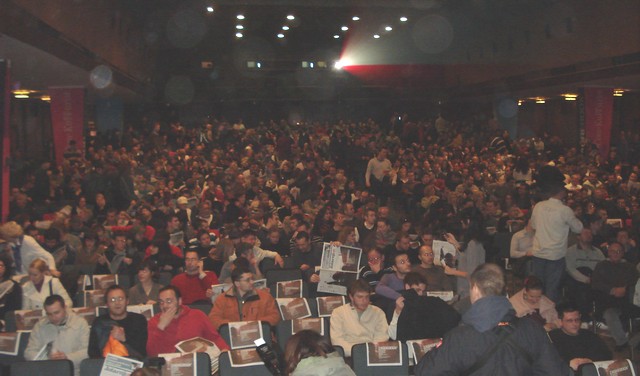 The documentary film by Jack Baric has raised unprecedented interest in the Student Center Cinema in Zagreb.  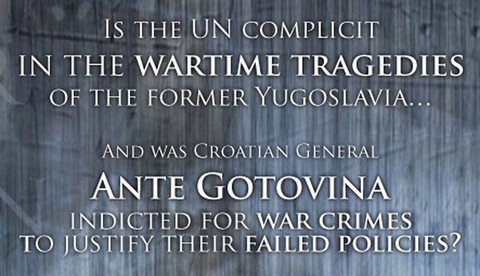
THE HISTORY:
In 1991 Croatia declared independence from Yugoslavia. The Socialist Federal Republic of Yugoslavia was formed after World War II and included six republics and two provinces. The nation was held together under the iron fist of its dictator, Marshal Josip Broz Tito. During Tito's 35 year rule it was often forbidden for the various peoples of Yugoslavia to celebrate their own ethnic cultures. This was especially true in Croatia.
After Tito's death in 1980 and the fall of the Berlin Wall in 1989, Yugoslavia began to unravel. In Serbia, Slobodan Milosevic rose to power and he vowed to keep Yugoslavia together with all of the power centralized in the Serbian capital, Belgrade. After Milosevic and his allies made several inflammatory political and constitutional moves that would effectively make Serbia the ruling power of Yugoslavia, the other republics balked and Croatia and Slovenia became the first to secede on June 25, 1991. Ultimately all of the republics seceded from Yugoslavia and Serbia, including Montenegro, a longtime ally of the Serbs.
Upon Croatia and Slovenia's secession, Milosevic ordered in the Yugoslav army to attack, ostensibly to keep Yugoslavia together. The war in Slovenia only lasted two weeks before Milosevic turned the troops toward his real target, Croatia. It became quickly apparent that Milosevic's goal was to create a Greater Serbia out of the collapse of Yugoslavia, which ran from Serbia and Montenegro through Bosnia & Herzegovina and ate up most of Croatia.
The wars in Croatia and Bosnia & Herzegovina lasted four years. As the conflict was centered in the heart of Europe, it became a source for heated debate in the halls of international diplomacy. One of the core issues being debated was whether this was a civil war where the combatants shared equal guilt or a war of aggression by Milosevic and his Serb forces. Those who believed that Milosevic was the aggressor were angered by the United Nations arms embargo against all sides in the conflict. The embargo favored Milosevic because he had almost all of the weapons of the former Yugoslavia under his control.
The people of Croatia and Bosnia & Herzegovina suffered miserably from Milosevic's brutal military campaign of murder, rape and ethnic cleansing. During the course of the conflict over one hundred thousand people were killed and millions more displaced. In 1993, while the war still raged, the United Nations formed the International Crimes Tribunal for the Former Yugoslavia (ICTY), a war crimes court to provide justice for the victims of the countless atrocities committed during this brutal war. Even among some of its original proponents there are many critics of the ICTY who charge that the court is being used to create a narrative that justifies the UN position during the conflict that this was a civil war where all sides are equally guilty.
Near the war's end Croatia launched Operation Storm, an offensive to win back approximately 30% of its territory, which was under Serb control. The operation, which was under the command of various generals, including Ante Gotovina, was a stunning success. In just 72 hours Croatia regained all of the territory and was now in control of its entire nation. Ante Gotovina was hailed a liberator and hero.
However, in the aftermath of Operation Storm, many crimes were committed by Croats who had been previously displaced from the territory. Bent on revenge, many Croatians burned homes, looted and even murdered Serb civilians. General Gotovina was later indicted for his command responsibility of the operation. The ICTY prosecutors contend that Gotovina either planned or willfully ignored the crimes being committed against the Serbs. Gotovina's defenders respond that he is being made a political scapegoat and that he was not even in the area when the crimes were being committed because he had moved on with his troops in a joint Croat-Bosnian effort to fight the Serbs in Bosnia & Herzegovina.
Searching for a Storm filmmakers travelled through Croatia, Bosnia, Serbia, Paris, London, The Hague and the United States to interview lawyers, politicians, soldiers, journalists, ordinary civilians, clergy, and human rights activists and hear their various viewpoints on the war and whether Gotovina is guilty of war crimes or is being made a political scapegoat to justify UN policy failures during the conflict.
Source: searchingforastorm.com
|
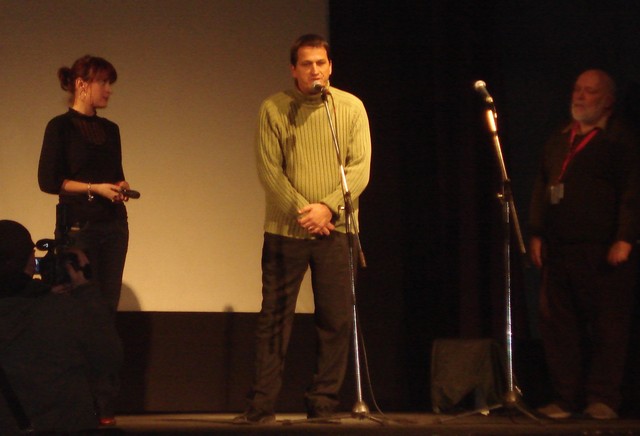 Jack Baric, in the middle, addressing to the audience at the Student Center in Zagreb immediately before the projection of his documentary, February 27, 2009 (due to enormous interest the documentary was shown also the next day). He is of Croatian descent, born in the USA and living in San Pedro.
THE DEBATE:
Was the war in the former Yugoslavia a civil war or a war of aggression by Slobodan Milosevic and his Serb forces? Is Ante Gotovina a hero or a war criminal? Was the UN court (ICTY) established to provide justice for the war's victims or do they have the political goal of trying to create a narrative that reinforces the UN's policy of treating the combatants as moral equals?
The following is a small sample of those debates that can be seen in Searching for a Storm.
Carole Hodge
Author, Britain and the Balkans
London, England
The Serbs did not get a signal from the international community that what they were doing in Croatia was unacceptable. The Serbs were allowed to continue with impunity.
Robin Harris
Author/Former British Policy Maker
London, England
By imposing an arms embargo on what had been the whole of the former Yugoslavia the UN ensured that those who needed to resist were not able to do so and that, of course, encouraged the people that had the arms to use them, namely Belgrade.
Anton Nikiforov
ICTY Prosecution Spokesman
The Hague, Netherlands
The UN imposed an embargo to stop the fighting, not to fuel it more. If you allowed everybody to buy arms the conflict would become much more bloody.
Goran Visnjic
Actor/Former Croatian Soldier
After singing stop the war in Croatia for a couple of months we realized nobody was going to give us a hand and we had to do this on our own.
Luka Misetic
Gotovina Defense Attorney
Chicago, IL
The Croatian army in 1991 and '92 was a ragtag group. Croatia did not have an army when it declared independence. It did not have experienced soldiers leading various units. When General Gotovina saw this conflict had broken out, he decided to return to Croatia.
Sime Kardum
Former Croatian Soldier
Knin Region, Croatia
Ante Gotovina is a pure hero and he'll stay a hero until the last Croatian is on the Croatian homeland.
Dejan Anastasijevic
Journalist, Vreme
Belgrade, Serbia
If it wasn't for the war in the former Yugoslavia Ante Gotovina would remain a petty adventurist. As a young man he joined the French Foreign Legion, served there, and mostly did petty crimes after that.
Archbishop Ivan Prendja
Catholic Archbishop
Zadar, Croatia
At the invitation of General Gotovina I gave a sermon to his commanders and sub-commanders on the ethics of war. I said that he who commits crimes and hates is actually the one who is most harmed.
Sonja Biserko
Human Rights Activist
Belgrade, Yugoslavia
I think it should be explained to Croatians and Bosniaks that Second World War atrocities, especially against Serbs in Croatia, were revived intentionally in order to create this atmosphere of fear where people were conditioned for war with an idea to prevent a new genocide.
Alain Finkielkraut
Author/Philosopher
As a Jew, I didn't want the memory of the Holocaust to be used as a tool by the Serbs to justify the massacre in an aggressive war.
Hasan Nuhanovic
Former Bosnian UN Interpreter
Sarajevo, Bosnia and Herzegovina
A number of Dutch UN soldiers witnessed executions right there on the spot (outside the gates of the UN base in Srebrenica). Some of those inside the base, like my family, were still safe. At one point the soldiers told us to tell the people that they have to go outside & my mother fainted when she realized that our family was going to be killed.
Anton Nikiforov
ICTY Prosecution Spokesman
The Hague, Netherlands
There is absolutely no human way to identify the aggressor. Unfortunately, politicians created this propaganda of who is the victim and who is the aggressor.
Bryan Suits
Former US Soldier in Bosnia/Radio Journalist
Los Angeles, California
The perception on the ground is that now these people are on the other side of Europe judging us, yet when the crimes were going on they couldn't stop them. If they can't identify an aggressor after aggression, then they're of no use to a rational world.
Emir Suljagic
Former Bosnian UN Interpreter
Sarajevo, Bosnia & Herzegovina
The ICTY has a major problem. It was started by the UN and by the time it was established the UN was deeply, deeply discredited. The UN has never reckoned with what it did in Bosnia & Herzegovina and Croatia and unless there's a reckoning, the UN will not have the moral credibility to be a constructive force in the world.
Source: searchingforastorm.com
|
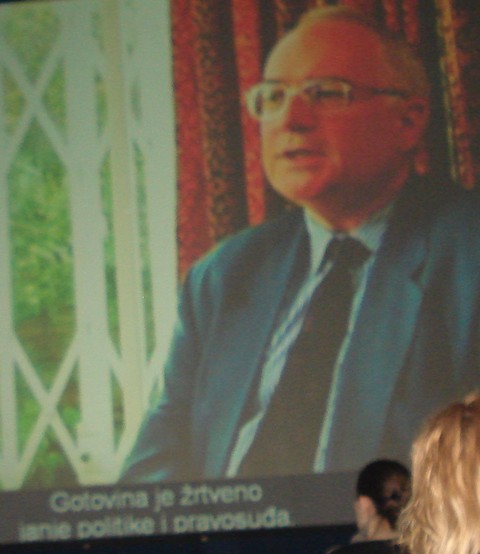 Robin Harris, London: Gotovina is a scapegoat of the politics and judiciary.
Mr. Harris is distinguished scholar, known in Croatia for his excellent book Dubrovnik: A History.
CONTACT / HOST SCREENING:
For more information about the film or how to host a screening at your club, center, or church, please e-mail to Jack Baric: jackbaric@hotmail.com
|
From: Tomislav Kuzmanovic (source: Croatian News)
Sent: Friday, February 27, 2009
Subject: Searching for a Storm interview
Dear friends,
Another update. The link below sends you to an interview of my friend, Jack Baric, and a discussion of his film about Operation Storm, the subject matter of my case before the International Criminal Tribunal for the Former Yugoslavia (ICTY), referred to above. Its world premiere is this weekend in Croatia. While my client is not profiled, only the first (and really target) defendant is, is interview gives a great synopsis of the BS we face when we deal with the alphabet soup of UN/Nongovernmental, "human rights" and other organizations/witnesses that did nothing from 1991-1995 while the only entity capable of ending it all, Croatia, in the end, after having armed and liberated itself, still suffers from the repercussions of taking its territory back. The general position of the "internationals" is that there was no aggressor, that everybody was the same, that "those people" have been fighting without end for centuries: mythology (and more accurately an excuse for inaction) at its best. Meanwhile, the average every day person, the vast majority civilian, no matter their ethnic background, suffered needlessly the most.
You wouldn't believe how the "neutral" UN in Croatia engaged in, among other things, black market selling of petrol to the occupying Serbs, human sex trafficking, spread unsubstantiated and unproven allegations of human rights violations to cover up for their lack of backbone and political will and to make "all sides equally guilty", etc., etc.
The interview is about 7 minutes long. It's worth watching. Jack does in 7 minutes of interview what is difficult to do in written form: explain quite simply the whole basis for why I'm here defending General Markac, and to some extent, Croatia's honor and dignity.
There's one thing to remember, though. "Trial" here isn't what you and I know it to be in the US. Anything goes, including hearsay, double hearsay, even triple hearsay, admission of documents without the foundational basis of the author or a records custodian. The Court can and does interrupt to ask questions all the time, witnesses are allowed, after all their testimony is complete, "to add anything to what you have said either in direct, cross or in response to questions from the bench," etc. It's a bit like the wild west, which makes it extremely challenging and exhilarating, but when you consider that someone's liberty is at stake, also disgusting and frustrating. We'll see how much we'll be able to get away with using the rules to our advantage in the defense phase of the case.
Please feel free to send to anyone. Thanks for your time.
Yours from wet and dreary Holland,
Tom
Tomislav Z. Kuzmanovic
Hinshaw & Culbertson LLP
100 E. Wisconsin Ave., Ste 2600
Milwaukee, Wisconsin 53202
Below is link to an interview with Jack Baric, director of Searching for a Storm. The first few seconds are in Croatian, but the interview is in English.
http://www.jutarnji.hr/zagrebdox?bcpid=13393037001&bclid=13319342001&...
|
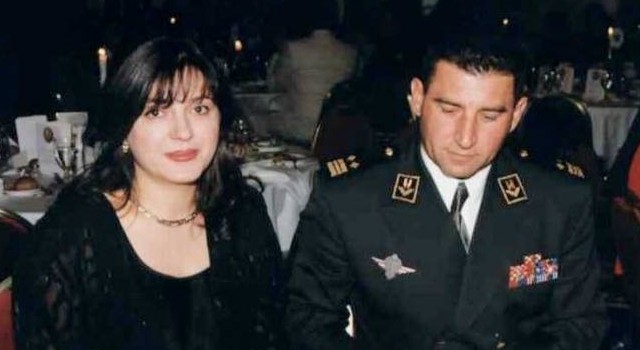 Croatian genaral Ante Gotovina and his wife Dunja.
Formated for CROWN by prof.dr. Darko ®ubrinić
Distributed by www.Croatia.org . This message is intended for Croatian Associations/Institutions and their Friends in Croatia and in the World. The opinions/articles expressed on this list do not reflect personal opinions of the moderator. If the reader of this message is not the intended recipient, please delete or destroy all copies of this communication and please, let us know! |
Related Articles
-
Louis Zorich the USA veteran stage actor has died in New York in 2018 at the age of 93
-
Luka Misetic and Tomislav Kuzmanovic presented with the 2012 Vinodol Code Award
-
Suncica - Sunny, Way of the Cross of Croatian women and children in Serbian concentration camps 1991-1995
-
Homeland defense is a right, not a crime
-
Ante Gotovina - Croatian general and painter
-
Slobodan Praljak: The truth about Croatia
-
Jack Baric Croatian American filmaker: UN Should Be Trailed!
-
Brian Gallagher interviewed Croatian American filmmaker Jack Baric
-
Croatian Heroes: Kata ©oljić legendary Croatian mother died
-
Croatian Heroes: Heroes of Vukovar TV serial by Eduard & Dominik Galic, part 10
-
Croatian Heroes: Heroes of Vukovar TV serial by Eduard & Dominik Galic, part 9
-
Croatian Heroes: Heroes of Vukovar TV serial by Eduard & Dominik Galic, part 8
-
Croatian Heroes: Heroes of Vukovar TV serial by Eduard & Dominik Galic, part 7
-
Croatian Heroes: Vinko Gecan USA
-
Croatian Heroes: Heroes of Vukovar TV serial by Eduard & Dominik Galic, part 6
-
Croatian Heroes: Heroes of Vukovar TV serial by Eduard & Dominik Galic, part 5
-
Croatian Heroes: Heroes of Vukovar TV serial by Eduard & Dominik Galic, part 4
-
Croatian Heroes: Dr. Juraj Njavro legendary surgeon at the Vukovar Hospital died
-
Croatian Heroes: Heroes of Vukovar TV serial by Eduard & Dominik Galic, part 3
-
Croatian Heroes: Heroes of Vukovar TV serial by Eduard & Dominik Galic, part 2
-
Croatian Heroes: Heroes of Vukovar TV serial by Eduard & Dominik Galic
-
Croatian Heroes: Pavo Urban defended Dubrovnik with his camera
-
Croatian Heroes: Dubrovnik defenders in 1991
Related Links
Comments
-
Comment #1
(Posted by jozo)
Odlicno !
-
Comment #2
(Posted by slavko)
In addition to Gen Ante Gotovina we have another hero in Jack Baric. His dedication in promoting the truth of the war should be an eye opener to all. Especially those who sit at the Hague.
-
Comment #3
(Posted by Marija Miletic Dail)
Bravo, Jack Baric! I feel honored that I have met you in Los Angeles!
Carry on the good work for Croatia and for our heroes, who have been dishonored by the enemy propaganda, just so that they come out clean and seem to be victims themselves. How long is the world going to be deceived?
We need people like you, Jack Baric, to open the eyes of the world. Thank you!
-
Comment #4
(Posted by Mara Radich)
Very informative and eye-opening. It is comforting to know there are still brave people out there fighting for the truth. God bless them all!
-
Comment #5
(Posted by Thomas Radovnikovic)
the fact no Russian, English,American or French has EVER been dragged before this mickey mouse court speaks volumes on it's biased role!
-
Comment #6
(Posted by Marija Miletic Dail)
Bravo, Jack Baric! We, Croatia, needs people like you. I also made a 10 min. short film during the war in the ninetees, called "What's Croatia, anyway", and sent it to all European heads of state as well as North American, and all the senators in US; telling them that Croatia was a kingdom long before EU was even dreamed of. Also showed the devastation of Vukovar, etc...but received only one answer, and that from Robert Dole, who thanked me for the enlightenment. I hope Jack's film will be seen by multitude and will change the perception about Croatia and what our general Gotovina did. We defended our homeland, as every country has the right and even obligation to do!
-
Comment #7
(Posted by maja )
thank you Jack Baric for your film!film is great!!!!!
Submit Comment
|
|